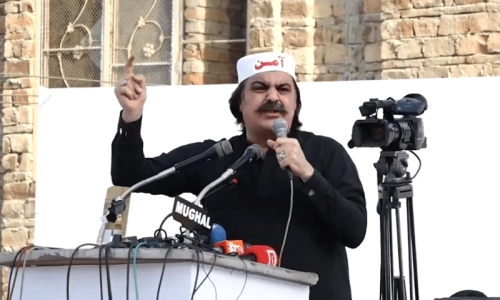ISLAMABAD: The Supreme Court on Wednesday rejected the appeal of death row convict Shafqat Hussain to set up a judicial commission to determine his age.
A three-member bench of the apex court, headed by Chief Justice Nasirul Mulk, heard the appeal against the implementation of the death sentence awarded to Shafqat.
During the hearing, Chief Justice Nasirul Mulk remarked that the issue of Shafqat had, to a large extent, been cleared by the courts. He said the verification of his age could only be re-evaluated by the relevant authorities. He also said that the apex court does not want to interfere with the work of "any institution".
He further said that only the president enjoyed discretionary powers to grant or deny clemency, adding that the court could not do anything in this regard. He also underscored that legal proceedings end after the review petition has been dealt with.
Meanwhile, Shafqat's counsel Advocate Tariq Hussain presented the stance that his client had been languishing in jail for the past 10 years, adding that it was his right to file a pardon request.
"We want that Shafqat's age should be re-evaluated."
He also said that under international law, Shafqat was entitled to many rights.
Responding to which, CJ Mulk said that international laws should be kept aside, and the matter should be dealt with as per laws in Pakistan.
Mulk said that after being convicted for murder, Shafqat's review petition had claimed that he was underage at the time of his conviction.
He said even the mercy petition had been rejected in Shafqat's case, adding that this was the second time they had approached the apex court on the matter.
The court subsequently rejected Shafqat's appeal challenging his death warrant.
“Sorry, the petition is dismissed. This matter has to come to an end someday," AFP quoted Mulk as saying.
Shafqat's counsel had earlier filed a basic petition in the IHC, calling for a judicial inquiry to determine his client's age. A single-member bench of the IHC had rejected his request, saying that his trial was in accordance with the law. IHC judge Justice Athar Minallah said that the material produced before the court did not suggest any irregularities or that he was a juvenile at the time of his conviction.
Examine: IHC dismisses petition seeking judicial inquiry into Shafqat's age
Following which, Shafqat's counsel had filed an intra-court appeal before a two-member bench of the IHC, which was also rejected.
Read: Shafqat’s plea dismissed
Shafqat was working as a watchman in Karachi in 2004 when a seven-year-old boy went missing from the neighbourhood. A few days later the boy's family received calls from Shafqat's mobile demanding a ransom of half a million rupees ($8,500 at the time), according to legal papers.
Shafqat was arrested and during his first interrogation admitted kidnapping and killing Umair, whose body was found in a plastic bag in a stream.
He was sentenced to death in 2004.
Shafqat later withdrew his confession, saying he had made it under duress, but the case came before an anti-terrorism court which sentenced him to death.
However, in late 2014 after the government lifted the moratorium on capital punishment, members of the civil society contended that Shafqat was a juvenile at the time of the incident.
Reintroducing the death penalty was part of Pakistan's move to step up the fight against militants since a Taliban massacre at a school in Peshawar in December last year. Following the lifting of the moratorium, Shafqat had been due to face the noose on Jan 14 but the government halted the execution amid protests about his age and ordered an investigation.
He was then set to be executed on March 19 but a day before the sentencing civil society representatives gathered in front of the presidency against the order. The hanging was subsequently postponed for 72 hours and then for 30 days.
A third death warrant for Shafqat Hussain was issued on April 24 after an executive inquiry by the FIA concluded that he was not a minor at the time the crime was committed.
His fourth hanging stay came on Monday, June 9, barely hours before he was due to face the gallows. The convict had filed a last-ditch petition before the Supreme Court on Monday, challenging the IHC order regarding his execution.
Take a look: Shafqat Hussain hanging postponed for fourth time
With additional reporting from Malik Asad in Islamabad














































